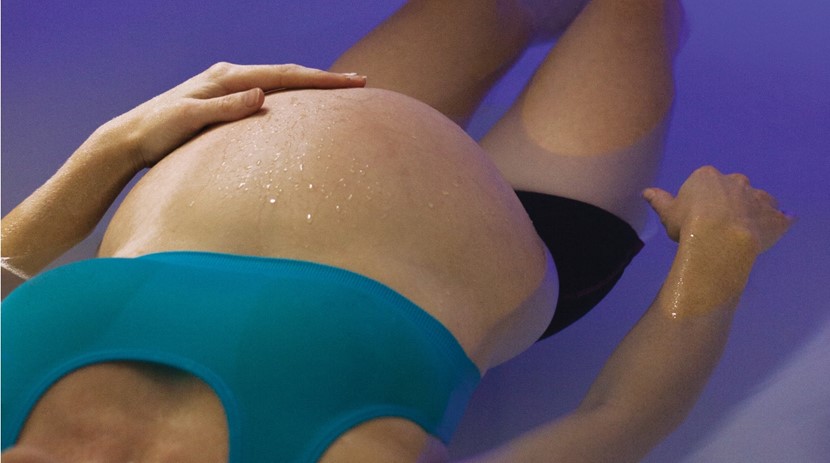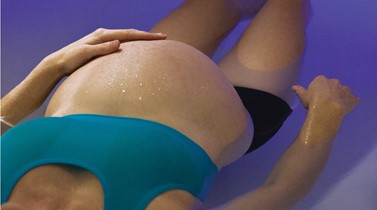Float away the stresses and strains of pregnancy

Swimming while pregnant can be sweet relief, due to the buoyancy provided by the water, but did you know there are specifically designed pods available to deliver enhanced benefits of flotation? Naturopaths Asti Renaut and Natasha Berman explain.
Asti has a beautiful photograph of her mother floating in the sea when she was heavily pregnant. She looks like a cross between a starfish and an archipelago of brown islands. She looks happy and very, very relaxed. She was living on Waiheke Island and would go down to the beach most days to float in the sea. Anyone who has been to Palm Beach in summer knows how warm and salty the water is; it seems to be more buoyant than other oceans somehow. So floating during pregnancy is not a new concept, but experiencing a floatation tank takes it to a whole new level.
Floatation tanks have been around since the mid-sixties when John Lilly developed the first such tank in an endeavour to offer people access to a state of deep meditation and relaxation. These tanks, or ‘pods’ as they are now known, have been updated and streamlined and are now available globally, being utilised by all sorts of people, including pregnant women.
Flotation involves lying in warm shallow water inside the pod, in relative darkness. This creates a state of sensory deprivation, ie none of the senses have any stimulation. Even the water isn’t ‘felt’ as it is at body temperature, meaning it’s hard to tell where the air starts and the water begins, or indeed where your body starts and the water begins. The effect of this? The mind goes quiet, and voilà – deep, deep relaxation.
Sensory deprivation: let’s have a think about that. As quoted in the film Float Nation, “It’s like the opposite of everything we do every day”. We are inundated – 24/7 – with sensory information. Information that our mind must constantly filter and process. Information we have to make decisions about, either consciously or subconsciously. Floating, therefore, could be a very simple remedy for our modern ‘over-thinking’ age.
Into the tank
The water inside a floatation tank is even more buoyant than that of Palm Beach, making it effortless to stay floating. It is a solution of water with added Epsom salts, made up of magnesium sulfate. This not only increases the buoyancy and density of the water, it also has many added health benefits. Absorbing magnesium through the skin allows it to work not only on relieving muscle tension and fatigue, but also to top up the body’s magnesium stores to help with reducing anxiety and improving sleep and exercise recovery, among other things. As naturopaths, we often prescribe magnesium for just these reasons, and magnesium deficiency is extremely common.
Typically, a floating session lasts between 60 and 90 minutes. You shower before and again afterwards. You can wear togs or go ‘nudies’ (as Asti’s two-year-old says). Some places will ease you in and out of the session with ten minutes of gentle music. The pods differ from place to place, but they are usually rather beautiful white space-age designs with gorgeous curves and features. Often the room is set up like a luxury spa, with all the fluffy towels you need.
People who float report amazing experiences and states of relaxation. Some people use flotation for meditation or to work through a specific experience in their minds. Some sports people use it for training or to process an event. Many use flotation to improve anxiety or improve sleeping patterns. Most people who have tried floating once simply want to integrate it into their lives in a regular way, because of how good it makes them feel, and the flow-on effects that infuse into their daily lives.
Go deep
The relaxation feeling is akin to states of deep meditation, measured objectively by brain waves that fall into the ‘theta’ frequency. Basically, there are five brain states or frequencies; beta, alpha, theta, delta, and gamma. While beta is a state of awakeness and alertness, where waves range between approximately 13 and 40 hertz, theta is around 3-8 hertz. Theta state is characterised by increased creativity and intuition, it is a dream-like state, the one we sometimes glimpse just before we go to sleep. Increased time spent in theta state may also increase learning and memory.
As you can see, floating in a pod, with 500kg of Epsom salts and devoid of all sensory stimuli, takes the concept of floating to a completely different level than floating in the sea could ever provide. Think of the best time you’ve had floating in the sea, then quadruple it and add a layer of bliss. This takes a leisurely activity into the realm of therapy, and there are studies to prove it.
One of the concerns we have always had about floatation tanks is the potential for claustrophobia. Of course, we're not alone. One floater shared that she felt exactly the same way initially, but because she was completely in control of the whole process, and could take it slowly, she felt absolutely fine. She even reported that she tried to submerge herself, just to see if it was possible to slip underwater unawares, but she said it was impossible – “even if you fell asleep, you’d be sweet!”.
Floating benefits
Flotation can be therapeutic for everyone, but the benefits of floating are potentially even greater during pregnancy. While floating during pregnancy is very safe, most businesses who offer this service require clearance from a woman’s midwife or GP, and only offer it to women in their second and third trimesters.
As pregnant women get larger and heavier, there is obviously more pressure on their bodies – not just muscles and skeletal structure, but also on internal organs. Flotation offers the possibility of weightlessness, a chance to literally ‘take the pressure off’. This can be especially beneficial for women needing pain relief for sore joints or aching backs, and the Epsom salts enhance this effect. The magnesium sulfate of the salts can also help to reduce swelling and inflammation in the body, and support balancing the extra fluids that build up in sometimes uncomfortable places during pregnancy.
One of the other common issues for women during the later stages of pregnancy is sleeping problems. The combination of both deep mind relaxation and physical relaxation of the body offered by flotation has huge benefit for improving sleep. One study looked at 36 people with chronic sleep-onset insomnia and reported that even twelve weeks after stopping floatation therapy, sleep was still improved for its test subjects. This clearly shows that the floatation therapy has not only short-term effects, but far-reaching long-term benefits.
Reducing feelings of stress benefits both the mother and developing baby, as well as potentially improving birth outcomes. There is significant research about the effects of maternal stress hormones on the learning and developmental outcomes for her child once born. The upshot of this is that the more we can do to reduce our stress whilst pregnant, the better it is for both mother and child. Sometimes, as parents, it is easier to do something positive when it’s for our children, not just for ourselves! When you look at it that way, floatation therapy for us as parents also has beneficial outcomes for our children. Changing our perception of massage, floatation tanks and other relaxing endeavours from the category of ‘luxury extravagance’ to ‘good for the kids’ means we are more likely to do these things. Research shows, without doubt, that reducing a mother’s stress is good for her baby's development in utero, which means that treating yourself, or someone you know, to a massage or float is actually helping to build a brighter future by increasing the ability of our next generation. In essence, we’re saving the world!
Many women who float while pregnant report the profound connection they feel with their baby while they are floating, as there is an obvious ‘mirror effect’. The pod is warm and womb-like and mama is floating just like the baby inside her.
'Bliss' – Natasha sums up her floatation therapy experience in one word. “I went back to work the day after my ‘float’ and the girls kept asking me if I was okay - I was just so relaxed! I felt so cruisy and quiet and calm, and the effects lasted for days.”
You may have guessed that we are thoroughly convinced about the benefits of floating. But then perhaps it was inevitable – especially for Asti, given the time spent in her mum’s tummy, floating the summer days away under that warm sun, all those years ago on Waiheke. We’re just taking it to the next level. l
Asti Renaut and Natasha Berman are naturopaths based respectively in Christchurch and Auckland. They both enjoy working with children of all ages and helping parents find natural solutions to their children’s health needs. More of their advice (and Qbaby products) can be found at qbaby.co.nz.
A huge thank you to Float Culture Auckland, 0800 3FLOAT (35628), who kindly provided us with floatations for our article. Do yourself a favour and book your float today.
Photography: Alanna Dennis

AS FEATURED IN ISSUE 35 OF OHbaby! MAGAZINE. CHECK OUT OTHER ARTICLES IN THIS ISSUE BELOW

















